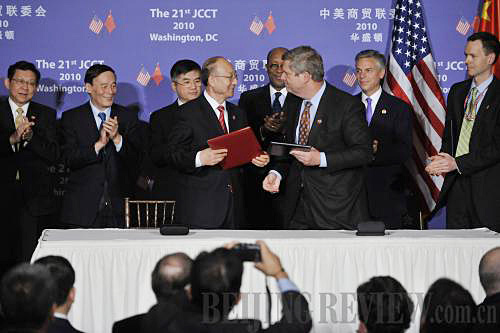|
 |
|
NEW DEALS: Chinese Vice Premier Wang Qishan (second left) attends a signing ceremony, along with U.S. officials, in Washington, D.C. on December 15, 2010, during the 21st session of the China-U.S. Joint Commission on Commerce and Trade (ZHANG JUN) |
What's more, a group of countries hold a complex attitude toward changes in China-
U.S. relations. This makes adjustment more difficult. These countries don't want to see a close relationship between China and the United States, and don't expect them to go to war, either. After all, peace and development remain the primary goals for most countries. Confrontation between China and the United States will also harm their interests.
These nations intend to actively make use of China-U.S. relations. In other words, they aim to balance the influences of the two countries and pursue their own interests in global and regional arenas by taking advantage of their disputes. This strategy has worked over the past year, but its possible long-term negative impact on the international system and the regional structure are worrisome.
Domestic changes
The problems in current China-U.S. relations are closely related to the two countries' domestic changes.
For the United States, its domestic situation has limited its flexibility. In 2010, the most significant domestic political focus was the midterm elections.
As it attempted to recover from the financial crisis, the United States shifted attention to domestic problems and cooperation with China was not deemed urgent. At the same time, China became the target of attacks in U.S. electoral campaigns, due to trade disputes and political differences.
Throughout 2010, Obama sent representatives to Beijing asking for suggestions during difficult moments in China-U.S. relations, but he seemed to have lost the ambition to promote China-U.S. relations that he showed upon taking office.
On the other side of the world, China faced new diplomatic situations, as well. Most prominent was an increase in the elements affecting Chinese diplomacy. The Chinese public now has more channels to obtain information and make comments. As a result, the public's ability to influence foreign policy is enhanced.
In addition, more government departments have become involved in foreign exchanges. Prominent examples include the role of the National Development and Reform Commission in climate change negotiations, the role of the People's Bank of China—the country's central bank—and the Ministry of Commerce in financial, economic and trade issues, the role of the military in security and the role of the Ministry of Education in cultural exchanges.
Faced with increasingly close ties between domestic and international situations, Chinese diplomacy needs to coordinate the interests and stances of various parties.
In this context, how to realize the healthy, stable and sustained development of China-U.S. relations has become a hot topic.
Future directions
In fact, the twists and turns in the China-U.S. relationship are inevitable. No two major countries are without differences and conflicts. Even apparently firm partnerships, like the U.S.-Japan and U.S.-Europe alliances, have faced fierce quarrels, over the relocation of the U.S. military base in Okinawa and the war in Iraq, respectively.
The main issue is not that China and the United States have differences, but how to prevent the differences from destroying the entire cooperative framework between the two countries and from increasing their strategic suspicions.
Therefore, the two countries should stick firmly to constructive cooperation. China-U.S. relations will inevitably be affected by an increasing number of international and domestic factors. In light of emerging complexities, the two countries should be clear about the significance of their cooperation in maintaining world peace and prosperity.
The two countries share extensive common interests on global and regional issues. However, both sides must combine these common interests with their own development goals. Only in this way can they translate their willingness to work together into concrete actions. Discussions on cooperation agendas should be continued.
They should also continue to improve bilateral dialogue mechanisms in order to prevent strategic misjudgments.
Last but not least, they should make efforts to strengthen mutual understanding and goodwill between peoples of the two countries. Public diplomacy and cultural exchanges should be given more important roles in China-U.S. relations.
The author is director of the Center for American Studies of the Shanghai Institutes for International Studies | 